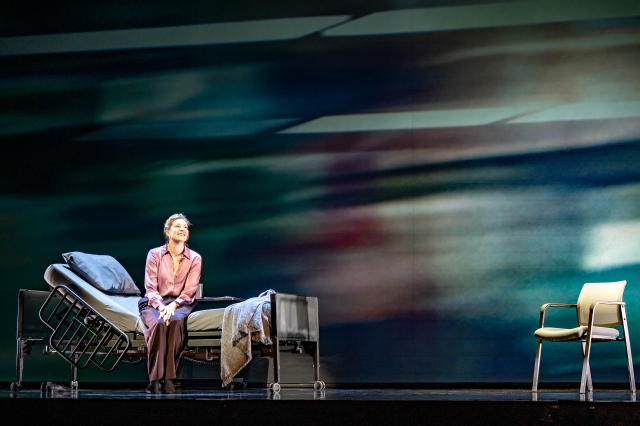Live and in person at the Young Centre for the Performing Arts, Toronto, Ont. a Soulpepper Theatre and Nightwood Theatre co-production in association with Necessary Angel and Talk is Free Theatre. Playing until November 10, 2024.
Written by Heidi Schreck
Additional writing support (Canadian adaptation), Damien Atkins, Gabriella King, Amy Rutherford.
Directed by Weyni Mengesha
Costume designer, Ellie Koffman
Lighting designer, Kimberly Purtell
Sound and composer, Richard Feren
Cast: Damien Atkins
Gabriella King
Amy Rutherford
The component of Heidi Shreck’s play that deals with the US Constitution is fascinating, well drawn and thought out. It is beautifully presented by Amy Rutherford. But including a segment that deals with Canada’s Charter of Rights and Freedoms just because this play is being performed in Canada, is insulting.
The Story. When American playwright Heidi Schreck was a 15-year-old high school student in 1989, she participated in various debates about the Constitution of the United States. She gave speeches on what the Constitution meant to her. That involvement earned Heidi the tuition for her time in university. She was keenly versed in the Preamble to the Constitution, the seven articles and the 27 amendments and it all comes through in this bracing, personal rendering of the ins and out of the U.S. Constitution.
When I say “personal” I mean Heidi Schreck notes her family history and how it applies (and sometimes doesn’t) to the Constitution. Abuse factored heavily in Heidi Schreck’s family. Her great-great grandmother was a mail-order bride to the United States. She was abused/beaten by her husband, Schreck’s great-great-grandfather and she died in a mental institute of “melancholia” at age 36. Heidi Schreck’s grandmother and mother were abused by their husbands. Abortion factors in the story—Schreck had an abortion in her 20s.
With finesse and grace Heidi Schreck analyses the Constitution with regards to its dealings with women, people of colour and reproductive rights. She notes how white men made all the decisions regarding these issues and even with 27 amendments, they still don’t seem to have gotten it right.
The Production. (Background). What the Constitution Means To Me started Off-Broadway in 2017 with Heidi Schreck playing herself at both 15 and in the present day. She then took the show to Broadway in 2019. It was celebrated, nominated for various awards, won a few and for the past two years has been the most performed play in the United States. The Soulpepper-Nightwood-Necessary Angel-Talk Is Free Theatre production of What the Constitution Means to Me at the Young Centre, is the first one to play outside the United States.
The production takes place in a legion hall of sorts (no designer is listed) with a podium, two chairs, an American flag and a backdrop of framed pictures of men in uniform. Amy Rutherford plays Heidi Schreck as both a buoyant, smiling 15-year-old and Schreck as an adult in the present day. Amy Rutherford wears skinny jeans, a work shirt and boots. The joy of talking about the Constitution bubbles out in her performance. There is conviction and that youthful confidence as she defends her position for the debate as the 15-year-old student, and a poised calmness as an adult when she is describing the harsh realities of how women have been treated by abusive partners, especially in her family. Weyni Mengesha directs with her usual surety, sensitivity and rigor.
Damien Atkins plays a military man who keeps track of the time in the debate scenes when Heidi is 15-years-old. Interestingly there is a heightened tension when Amy Rutherford as Heidi must adhere to a strict time limit to answer complex questions. Atkins is an unsmiling, very conscientious military man in these scenes. The character takes the job very seriously. He looks at a stopwatch and we watch him, watching it to be accurate. Ones heart is pounding.
After all the points of the play are made, in the original production and ones that have played across the United States, the last 20 minutes or so of this 100 minute show, is a debate between Heidi Schreck (or the actress playing her) and a high school student. They are debating whether or not the U.S. Constitution should be scrapped and a new one initiated. With the toss of a coin one side argues for the proposition, the other side argues against. But not in Canada.
Because of the impending U.S. election and Canada’s future election, Weyni Mengesha thought it might be a good idea to have that last 20 minutes be a debate about the Canadian Charter of Rights and Freedoms and Heidi Schreck agreed. In this instance, Damien Atkins, Gabriella King and Amy Rutherford are credited with providing additional writing support for the Canadian Adaptation.
So Amy Rutherford and Gabriella King, an accomplished author and high school student from Unionville, debate whether or not to scrap the Canadian Charter of Rights and Freedoms. Each side uses small recipe cards to note and express the points of their arguments. The audience makes the decision who wins and a member of the audience is chosen to voice the decision.
In fact, in this case the audience wasn’t consulted on the decision either by cheering or stamping their feet. A member of the audience—the estimable Karen Robinson at my performance—was asked to decide who won the debate. I would assume the decision changes with each performance. And while I believe that Weyni Mengesha’s decision to debate the future of the Canadian Charter of Rights and Freedoms is well-intentioned, I found that decision galling, if not insulting.
Comment. It seemed we Canadians should be puffed up and chuffed at the announcement that this is the first production of this American play outside of the United States and they have chosen Canada to play it. (sigh). How ever did we cope with the other American shows that have come north without fanfare? How did we cope in 1971 when the American musical 1776 (about the end of the war of Independence when Declaration of Independence is signed) played the Royal Alexandra Theatre for the summer, without need of explanation or nuance of how lucky we were that it played here?
And rather than give equal time to investigate our Canadian Charter of Rights and Freedoms we are given short shrift. As if we are an afterthought, an irrelevance. As usual. And while it would be a no-brainer, that after investigating our Charter for its pros and cons, the debate would be what country had the better “Constitution”, the United States or Canada?
But of course, that’s not the play that Heidi Schreck wrote. Neither is the play at the Young Centre. I loved the 90 minutes that actually dealt with Heidi Schreck’s play, What The Constitution Means To Me. I found the 20 short minutes devoted to the debate of the Canadian Charter of Rights and Freedoms an insult, an embarrassment and galling.
A Soulpepper Theatre and Nightwood Theatre co-production in association with Necessary Angel and Talk is Free Theatre.
Plays until Nov. 10, 2024.
Running time: billed as 90 minutes but is really 100 minutes. (no intermission)
{ 0 comments }

